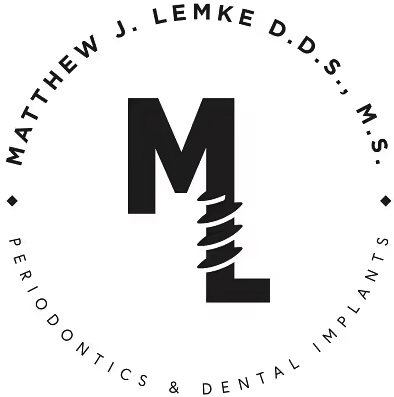WHAT TO LOOK FOR
The Most Common Symptoms of Gum Disease
Gum recession, loose teeth, bad breath and bleeding gums are all symptoms of gum disease.

Learn More About The Revolutionary No Cut, No Sew Laser Gum Surgery!
Gum Recession

Factors That Affect Gum Recession
Gum recession occurs when the gums start to pull back from the roots of your teeth.
Some causes of gum recession include:
- Periodontal Disease
- Genetics
- Tooth Brushing Routine
- Poor Dental Hygiene
- Hormonal Changes
- Tobacco Use
- Grinding or Clenching of Teeth
- Crooked Teeth or Bite Misalignment
- Body Piercing
Steps To Prevent Recession
Steps suggested to prevent gum recession include:
- Seeing your doctor for regular cleanings and checkups
- Not smoking or using other tobacco products
- Eating a healthy and well-balanced diet
- Using the proper brushing techniques with a soft-bristled toothbrush or an electric toothbrush
- Seeing your doctor to correct a misaligned bite or teeth grinding problems
Gum recession (receding gums) is a common concern for many patients. It occurs when soft tissue starts to erode and travels down the roots of the teeth.
Receding gums usually develop over time. Some patients may not even notice it happening until it progresses and becomes more obvious. Symptoms include gaps between the teeth, tooth sensitivity, changes in the appearance of the smile, and teeth that appear longer than usual. Notches and dents in the tooth structure are also signs of gum recession.
Receding gums, which may indicate gum disease, will not reverse on their own. Preventing or treating gum disease today with Dr. Lemke and Dr. Mehandru can help prevent gum recession tomorrow.
What Causes Receding Gums?
- Gum disease: A bacterial infection in the mouth can destroy the soft tissue and lead to bone and tooth loss if left untreated.
- Genetics: Some people are predisposed to developing gum recession due to gum disease, no matter how well they take care of their teeth and gums.
- Vigorous tooth brushing: Brushing too hard can damage soft tissue and contribute to receding gums.
- Poor dental hygiene: Brushing and flossing regularly keep harmful bacteria off the teeth and gums. Failure to do so can lead to periodontal disease and receding gums.
- Hormonal fluctuations: Women who experience changes in their hormonal levels may develop tissue tenderness and gum recession.
- Tobacco use: Tobacco can lead to a buildup of plaque on the teeth, increasing the risk of periodontal disease and recession.
- Grinding and clenching teeth: Constant clenching and grinding can contribute to gum recession.
- Crooked teeth/misaligned bite: Misalignment can put excessive stress on the gums and jawbone, leading to gum recession.
- Piercings: Tongue and lip piercings may irritate the gum tissue and cause it to recede.
Treatment for Receding Gums
Addressing gum disease: If gum disease is the cause, treatment can help prevent recession from worsening. A deep cleaning, laser therapy, and antibiotics may be used to remove harmful bacteria, plaque, and calculus.
Grafting: Soft tissue grafting can restore the gumline using material from the patient’s own mouth or a tissue bank.
If you have gum recession, Dr. Lemke and Dr. Mehandru in Wooster, OH, can help. Call us today for your consultation.
Loose Teeth
Loose or missing teeth often result from untreated periodontal disease, a bacterial infection that destroys the supporting structures of the teeth. Other gum disease symptoms may include bad breath, bone loss in the jaw, gum recession, and additional complications that Dr. Lemke and Dr. Mehandru can treat. Injuries, disease, and genetic factors can also contribute to missing teeth.
Gum Disease Symptoms
Gum disease symptoms vary, but common indicators include:
- Sensitive, red, inflamed gums that bleed, especially when brushing or flossing
- Pus around the teeth or gum line
- Trapped food around the teeth or beneath the gums
- Gum recession (receding gums)
Gum Disease and Missing Teeth
Loose or missing teeth may indicate gum disease. When bacteria remain trapped between the teeth and gums for long periods, they can begin to destroy soft tissue and bone. Without treatment, teeth may loosen and eventually fall out. However, it is important to note that not everyone with gum disease exhibits noticeable symptoms.
Avoid Missing Teeth with Treatment
Brushing and flossing regularly, along with scheduling routine dental visits, is the best way to prevent missing teeth. Maintaining a healthy diet and, in some cases, taking vitamin supplements prescribed by a doctor can also help manage gingivitis, the early stage of gum disease.
Treating Loose Teeth
Dr. Lemke and Dr. Mehandru treat gum disease symptoms daily, including loose and missing teeth. Treatments such as deep cleanings, laser gum surgery, antibiotic therapy, gingival and bone grafting, and dental implants can restore oral health.
Do not ignore gum disease symptoms. Dr. Lemke and Dr. Mehandru in Wooster, OH, can address loose or missing teeth. Call us today for your consultation.
Bleeding Gums
 Bleeding gums can occur for various reasons. If you are experiencing bleeding gums, Dr. Lemke and Dr. Mehandru, periodontists in Wooster, OH, can determine whether gum disease is the cause. Bleeding gums often appear red, inflamed, and sore—common symptoms of gum disease that should not be ignored.
Bleeding gums can occur for various reasons. If you are experiencing bleeding gums, Dr. Lemke and Dr. Mehandru, periodontists in Wooster, OH, can determine whether gum disease is the cause. Bleeding gums often appear red, inflamed, and sore—common symptoms of gum disease that should not be ignored.
Gum Disease and Bleeding Gums
Too much harmful bacteria in the mouth, often due to poor oral hygiene, can infect and inflame the gums, causing them to bleed. Bleeding gums may also indicate gingivitis, the first stage of gum disease. Regular exams with Dr. Lemke and Dr. Mehandru can help catch it early. Otherwise, untreated gingivitis can progress into periodontitis, a more serious condition that destroys bone and may lead to tooth loss. Laser gum surgery and proper oral hygiene can help manage periodontitis.
Medication and Bleeding Gums
If you experience bleeding gums and take medication, be sure to inform our doctors. Certain medications, such as blood thinners, NSAIDs (non-steroidal anti-inflammatory drugs), blood pressure medications, and birth control pills, can contribute to gum bleeding.
Pregnancy and Bleeding Gums
Pregnancy-related hormonal changes may cause gums to become tender and more prone to bleeding. Pregnant women with periodontal disease are at a higher risk of premature delivery and low birth weight babies. Maintaining good oral hygiene is essential during pregnancy.
Do not ignore bleeding gums. Dr. Lemke and Dr. Mehandru are leading periodontists in Wooster, OH, who can help determine the cause and recommend appropriate treatment. Call us today for your consultation.
Bad Breath
Patients with gum disease symptoms often complain of bad breath (halitosis). While bad breath can result from gum disease, it may also indicate other conditions.
Flossing and brushing at least twice a day, using a tongue scraper, and scheduling routine exams with Dr. Lemke and Dr. Mehandru can help prevent bad breath. Otherwise, bacteria can accumulate between the teeth and gums, leading to an unpleasant odor.
Other Causes of Bad Breath
- Strong foods like garlic, onions, and cheese
- Tobacco use, which irritates gums and diminishes taste perception
- Dry mouth, yeast infections, cavities, diabetes, acid reflux, respiratory infections, and sinus issues
To address bad breath, maintain proper oral hygiene, avoid smoking, stay hydrated, and be mindful of dietary choices.
If you have persistent bad breath, a visit with Dr. Lemke and Dr. Mehandru can determine if gum disease is the cause. If so, gentle laser gum surgery in Wooster, OH, can help treat the condition. Call us today for your consultation.
